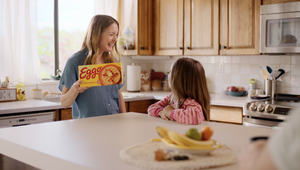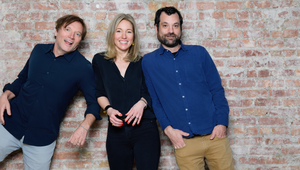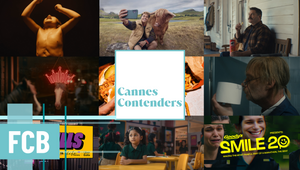
How Budweiser Literally Platformed Women and Non-Binary Talent during the BRITs

On the eve of the 2023 BRITs, responding to the award show’s male-only nominations for its gender-neutral ‘Best Artist’ category, Budweiser and FCB New York created a platform for women and non-binary artists - and that’s not a metaphor. Taking one of the AB InBev brand’s billboards in Shoreditch and turning it into a physical stage, the creative agency and Budweiser gave an opportunity to several up-and-coming female and non-binary artists to perform in front of a live crowd and be live-streamed globally.
As well as setting the stage for a new generation of diverse talent, there is a particular success story that has also come from the project. At the event, Hackney-born headliner Mychelle was scouted by music artist management company Kobalt Music, resulting in the company helping to produce a single with the artist.
To discuss the logistical and creative challenges of turning a billboard into a stage for a gig and how Budweiser is helping to inspire young, diverse artists to achieve greatness, LBB’s Ben Conway spoke with Todd Allen, vice president of global marketing at Budweiser and FCB New York’s group creative director, Alex Abrantes.
LBB> What was the creative spark that launched this campaign? Why did Budweiser and FCB create a platform (literally) for up-and-coming female and non-binary talent ahead of the Brits?
Alex> Budweiser’s global platform is ‘Greatness Is Yours to Take’ and the brand constantly activates in ways to give up-and-coming artists a platform for greatness. When the BRIT Awards nominated only men for its gender-neutral ‘Best Artist’ category, we knew we had to do something. So we turned one of our existing billboards in London into an actual stage. We gave a stage for women and non-binary talent when the most prestigious award show in Europe snubbed them.
Todd> Budweiser has always celebrated greatness and we wanted to build a stage where everyone could have an opportunity to expose their talent to the industry during a huge moment in music. Budweiser has set out a rallying cry for those who are determined to achieve their dreams, inspiring emerging talent to seize greatness.
LBB> What was the strategy behind the stage placement and the decision to stream the performances elsewhere?
Alex> During the BRIT Awards weekend, the global music industry is gathered in one place. Not only artists but producers, agents, managers, publishers and anyone who’s anyone in the music industry comes to London. So we did a lot of research work to identify the hotels where people from the music industry stay (some call it stalking, we call it research). We cross-referenced with the location of big music labels and publishers, like Warner Music and Kobalt Music and then we added one extra element: music labels’ parties and events locations. Once we had all that data we triangulated everything to pinpoint the ideal billboard to be transformed into a stage.
But more than finding the perfect placement for the stage, we needed to make sure that those producers, managers, agents and recruiters were being impacted by it. So we streamed the performances everywhere they were, including the BRIT Awards themselves. We bought media inside the O2 Arena during the BRIT Awards and played our show there, with a QR code that directed to information about, and to the music of, those artists.

LBB> Were there any challenges in creating this stage and organising a live music event at the Shoreditch billboard? What was the process like of getting permission and organising the event logistically - from the other side of the Atlantic too?
Alex> We had to act fast. So yes, it was absolute madness. But we weren’t alone in this. FCB and Budweiser teamed up with Grand Visual, a production company based in London specialising in OOH. They were absolutely fantastic with all the logistics, design and engineering of it – and literally built a stage off of a billboard in two days. That, of course, took lots of early meetings for the people in New York and lots of late calls for the ones in the UK. But it was all worth it.
Finding a way to make it all safe was a major concern but another one was: how to make it feel like an exciting stage, where those artists could shine, without losing the characteristics of the billboard.
It would have been easy to build a stage in front of the billboard, but by keeping the billboard vibe, the whole concert ended up with a real subversive, counter-culture energy, which made the experience cooler for the fans. And on top of that, it allowed us to use a billboard permit, versus an event one - which would have taken way longer. It was a hack of the music industry and of the media itself.
LBB> How did you select the lineup of talent?
Alex> Our only rule was that it had to be women or non-binary - since men already had all the exposure they could get at the actual BRITs. The stage was open for those bold enough to get up there and take it. Luckily, London is full of really talented people and some amazing names showed up. During the days leading to the event, we had social posts, underground radio stations and wild posters in London looking for talent. Then we partnered with the Department of Music to make sure those people get paid. They deserve it.

LBB> One of the artists, Mychelle, has had quite the journey thanks - in part - to this activation. Can you tell us about that and what it means to you?
Alex> It means the world to us that this idea helped Mychelle get a deal and produce a single with Kobalt Music, a company that has Childish Gambino, The Weeknd and Paul McCartney as clients. But ultimately, it was her boldness and her greatness that gave her the courage to take that billboard stage and show the world what she’s capable of. It just proves the power that creativity has and the importance of what we do. We have a chance to impact people and perhaps even culture with our work.
Todd> We are thrilled with the outcome of the activation and excited for what lies ahead for Mychelle. Her hard work and determination, combined with the courage to take the stage, is inspiring to us.
LBB> What was the turnout like at the live event? And how did people react to the stage and the livestreams?
Alex> It was beyond positive. We had to close the access and limit the number of people - per safety regulations. It’s not every day that you close a street in a busy neighbourhood and people get excited about it. Online the response was massive, as well. We live-streamed it globally, and people from different continents watched and commented things like, “Just send them to the BRITs,” and that was amazing.

LBB> How has Budweiser supported female and non-binary artists in other commercial efforts?
Todd> As part of our activations in Qatar for the men’s FIFA World Cup 2022, we took over the W Hotel to host over 100 content creators from around the world for unique Budweiser experiences. This diverse group of iconic international musicians, artists, and influencers represented unique journeys to achieving greatness and coming together in celebration of the world’s largest sporting event. Musical artists, like Brazilian, LGBTQIA+ musician Ludmilla, performed for fans celebrating in the country.
LBB> During the creative process, what gave you the most satisfaction? And equally, what provided you with the hardest creative challenge? How did you overcome it?
Alex> What gave us the most satisfaction was obviously to give an actual stage to women and non-binary talent, especially when the biggest stage in Europe denied them. And for one of those women to get a deal and produce a single with Kobalt Music was the perfect result of such a bold statement by a brand. The hardest challenge was the logistics of bringing this idea to life. We had to act fast. We had days to figure out how to turn a billboard into a stage, find the right location, and make sure that the music industry saw it. If you think about it, we used a billboard, a massive piece of out-of-home, for a very tailored, direct campaign. And that wasn’t easy.
There’s no secret to how to overcome big challenges. You need to find the right partners - and we did - starting with our client, who held hands with us and couldn’t be more excited about this activation, to Grand Visual and everyone who worked with them to make this possible. It’s not easy to hear someone say they want to turn a billboard into a stage and say ‘Yes!’ right away.















